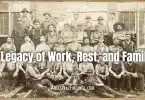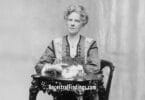As the United States marks its 249th year of independence, it’s a fitting time to pause and reflect—not just on fireworks and parades, but on the remarkable clarity of vision held by those who signed their names to the cause of liberty. These were men who risked everything—their lives, fortunes, and sacred honor—not for gain, but for the enduring hope of a free and virtuous republic.
Their words, written in the heat of war and the uncertainty of revolution, are more than historical relics. They are guideposts. Warnings. Encouragements to stay the course. And when we take time to read them with fresh eyes, we realize how much they still matter.
Cultivating Character: John Adams on the Moral Foundation of Liberty
In 1776, as the fires of revolution raged, John Adams turned his attention to the next generation. In a private letter, he urged parents and leaders to raise children with lofty aspirations. He wasn’t talking about academic achievement or material success. Adams was concerned with character—nurturing minds that sought after truth, and hearts rooted in justice, courage, and morality.
His emphasis on religion, morality, and liberty wasn’t rhetorical. Adams saw these as the three strands that formed the fabric of a stable republic. Liberty, without morality, was dangerous. Morality, without religion, was fragile. To him, the survival of the American experiment rested on teaching young people to scorn cowardice and falsehood, to revere truth and sacrifice.
This wasn’t idealism—it was survival. A free people, if they lacked inner virtue, would eventually lose their freedom.
The Vigilant and the Brave: Patrick Henry’s Call to Action
A year earlier, Patrick Henry gave his now-famous warning that the battle would never belong to the strong alone—but to those who stayed alert and willing. His words rang out during a time of fierce debate, when many colonists still hoped to avoid a fight. Henry saw the writing on the wall. Appeasement wouldn’t work. The hour called for resolve, not retreat.
“Give me liberty, or give me death” is the phrase everyone remembers, but that line followed a much deeper insight: that freedom is the reward of the vigilant. It must be guarded, often against the odds. It is not handed down without cost.
To Henry, bravery was not just standing on a battlefield. It was a state of the heart—an unwavering willingness to act, even when the outcome was uncertain. In our own time, vigilance might not mean musket drills, but it certainly calls for a readiness to speak truth, stand firm, and resist creeping complacency.
Liberty and Safety: Benjamin Franklin’s Cautionary Wisdom
In 1775, Benjamin Franklin offered one of the most quoted maxims of American history, warning that those who trade essential liberty for temporary safety deserve neither. It’s a sobering thought, especially in a world where the promise of security is often used to justify growing government control.
Franklin’s point wasn’t that safety is unimportant. Rather, he understood human nature well enough to see that fear could be weaponized. When people are frightened, they can be convinced to give up freedoms they might never have surrendered otherwise.
The Founders had no illusions. They knew that future Americans would be tempted to soften the hard edges of liberty in exchange for convenience. Franklin’s warning is not a rejection of safety, but a plea to count the cost. Liberty is not something to be bartered.
The Sharp Rebuke of Samuel Adams
Few were as passionate or plainspoken as Samuel Adams. In 1776, he offered a stinging rebuke to those whose comfort mattered more than freedom. If liberty was not cherished, he said, if servitude was preferred to struggle, then perhaps it was better for those individuals to quietly leave the fight.
He was not trying to be cruel. Adams had simply seen too much apathy in the face of tyranny. The Revolution needed true believers, not fair-weather patriots. His call was meant to separate the committed from the comfortable.
What makes this quote so powerful is its warning to every generation: Freedom is not a spectator sport. You are either shaping it, preserving it, or standing by as it slips away.
John Adams, Again: A Fear of Consolidated Power
In his later years, John Adams reflected with concern on how the federal government was being viewed. In 1824, he made a bold distinction: Congress was not meant to be a consolidated governing body, but a diplomatic assembly of states. To Adams, the strength of the republic lay in its structure of distributed power.
He feared that consolidation, whether under a monarchy or a powerful central democracy, would collapse under its own weight. This was a man who had seen the rise and fall of governments around the world, and he knew that too much central control, even with noble intentions, could lead to the very tyranny the Revolution sought to escape.
Today, that concern seems startlingly prophetic. As power accumulates at the national level, Adams’s warning sounds a clarion call for decentralization, for restraint, for accountability to the people and their local communities.
Why Their Wisdom Still Matters
It can be easy to look at the Founders as distant figures from another world. But their words were not for a moment—they were for a mission. They wrote and spoke with the full awareness that their actions would echo far beyond their lifetimes.
They weren’t perfect men, nor did they pretend to be. But they gave everything to birth a nation governed not by kings or mobs, but by laws, and by the consent of the governed. Their vision depended on an engaged and educated citizenry—one that understood the link between private virtue and public liberty.
In a time when political noise is loud, and historical literacy is declining, revisiting the Founders isn’t just educational—it’s essential. Their warnings, hopes, and exhortations give us a compass. And we’d be wise to pay attention.
A Final Thought for Independence Day
As we approach the 250th anniversary of American independence, may we not only celebrate but remember. Remember the kind of men who made freedom possible. Remember the price they paid. And remember the words they left behind—not as relics, but as rallying cries.
Freedom requires more than gratitude. It asks for vigilance. For virtue. For courage in quiet places.
And if we want to honor the Founders, perhaps the best way to do it is to live as they hoped we would: as free men and women, with hearts and minds fixed on what is good, true, and enduring.






